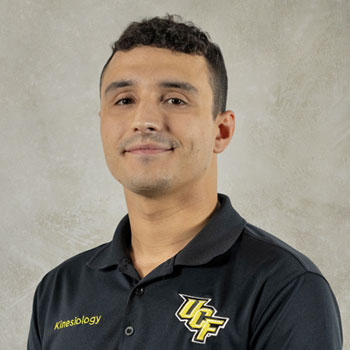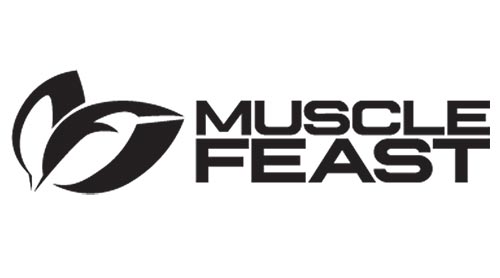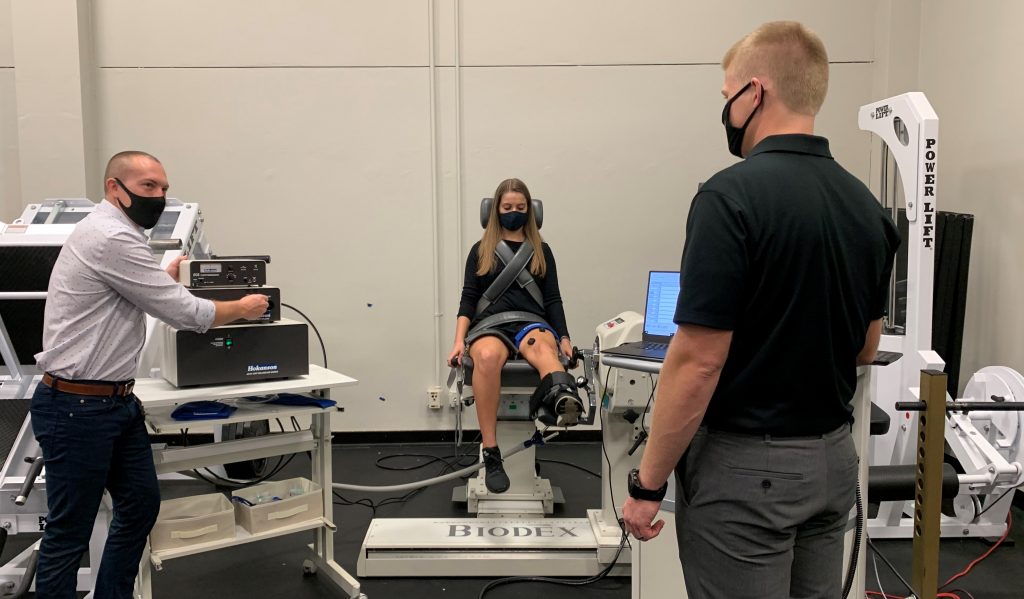Blood Flow Restriction Laboratory (BFR Lab)
UCF Division of Kinesiology
Overview
The primary focus of the UCF Blood Flow Restriction (BFR) Laboratory is to identify exercise and/or rehabilitation strategies that elicit the most robust physiological responses among men and women with a particular emphasis on neuromuscular and cardiovascular function. The laboratory examines various interventions to determine the applicability of exercise, devices, and/or external stimuli to promote or maintain human function in asymptomatic and clinical populations. The laboratory is currently applying BFR exercise as a rehabilitative strategy to help restore neuromuscular and muscle function among people with multiple sclerosis. The laboratory is also evaluating the utility of BFR as a countermeasure to offset the effects of prolonged spaceflight on cardiovascular function.
Research Techniques/Equipment
Blood Flow Restriction
- Hokanson rapid cuff inflators
- SujiBFR systems (version 3)
Cardiovascular Testing
- MGC Diagnostics Mobile Ultima Cardio2 System
- Trackmaster TMX
- Corival 400 cycle ergometer
Endothelial Function
- MOOR VMS laser doppler blood flow and temperature monitor
- Flow-mediated dilation and wall tracking software
Neuromuscular Function
- Delsys Trigno Wireless EMG
- BIOPAC MP150 System
- BIOPAC BioNomadix Wireless Dual-Channel EMG
- Digitimer High Voltage Constant Current Stimulator
Strength/Power Testing
- HUMAC Norm isokinetic dynamometer
- Biodex isokinetic dynamometer
- Pancake load cells
- Resistance exercise equipment (upper and lower body)
Equipment with Overlapping Purposes
- Artinis PortaLite MKII near infrared spectroscopy
- GE Logiqe ultrasound
Current Research Projects
CREW (Creatine and Resistance Exercise in Women)
This research is examining the changes in muscle size, muscle function, body composition, strength, and blood vessel health. Specifically, the changes in these variables over the course of 8 weeks of training with or without blood flow restriction (BFR) and the supplementation of creatine or placebo (dextrose, a sugar in the form of a powder which is the standard placebo). Creatine monohydrate (Cr) is the most popular supplement for athletes and benefits all populations, however women are still very hesitant to take it due to the misconception of weight gain. This study will look to measure those muscle and body changes with exercise.
The Effects of Blood Flow Restriction on Aerobic and Muscular Function
The purpose of this study is to compare muscular, neuromuscular, and metabolic differences in running at a high intensity to running at a moderate intensity with blood flow restriction. We are recruiting aerobically trained males and females to helps determine these differences. In total, the study involves four visits each lasting about 90 minutes for a total of 6 hours. By participating in this study, you will be given your VO2 max.
Consider taking part in a research study that uses different techniques, including EMG, VO2, and heart rate, to examine aerobic/anaerobic thresholds during three different maximal aerobic exercise tests. We are recruiting aerobically trained males and females to help us study different types of exercise thresholds and methods to assess the thresholds. A threshold is when our body switches from using oxygen (aerobic) to create energy to methods that used things like stored sugar (anaerobic) to create energy. This study involves 4 total visits for a total of 4-5 hours. After this study you can be provided with your VO2max and several of these thresholds.
Acute Effects of Resistance Exercise Among Individuals with MS
Consider taking part in a research study that seeks to examine the acute effects of BFR exercise training on patients with MS. This study involves 4 total visits, each lasting 60-90 minutes. During each visit, surface electromyography, heart rate, and blood flow restriction will be assessed during three types of BFR protocols to gain a better understanding of which is best for this population. This study will take place in the Kinesiology Labs, in the Education Complex on the main campus of the University of Central Florida.
Meet Our Team
Director
Ethan Hill, Ph.D., CSCS, ACSM-EP
Graduate Assistants
Research Assistants

Niriham Shah

Nihar Patel

Anuj Prajapati

Esteban Tarazon

Emily Wagner

Lauren Rejko
Contact
The Blood Flow Restriction Laboratory (BFR Lab) is located inside the Division of Kinesiology at the Education Complex and Gym, ED 174. Several handicapped parking spots are available outside.
"*" indicates required fields
UCF Blood Flow Restriction Laboratory (BFR Lab)
Education Complex and Gym, ED 174
4000 Central Florida Blvd
Orlando, FL 32816








